Bored of the usual marble and granite in the home? If you want to break away from the old and conventional stones and are looking for something new and trendy, take a look at engineered quartz. Engineered quartz is a contemporary stone material that is factory-manufactured with quartz aggregate chips bound together with resins, pigments and other additives. The material stands out because of its high-end, modern look that infuses sophistication into a home’s decor. The extreme hardness of engineered quartz makes it a popular substitute for granite, especially in areas that are subjected to high wear and tear, such as the kitchen or bathroom countertops, tabletops and flooring.
Here is a guide to the pros and cons of engineered quartz stone.

Pro: Hard and durable
Engineered quartz is long-lasting and extremely durable: it is stain-, scratch- and abrasion-resistant, and can last a lifetime. Unlike other natural stones, it is non-porous and does not require sealing. Also it does not support the growth of bacteria, viruses, mould or mildew, which makes it one of the most hygienic countertop materials available in the market.
Note: As a precaution against scratches, it is advisable to use a cutting board and to avoid chopping vegetables directly on the counter.

Pro: Available in multiple options
Engineered quartz comes in various textures, patterns and colours, including bright greens, blues, yellows, reds, as well as those that mimic natural stone. . The stone looks smooth if the natural quartz in it is finely ground, and speckled if it is coarsely ground. During the manufacturing process, colour is added to the mix, along with elements such as glass or mirrored chips, to give a speckled appearance. Unlike granite, once the stone is installed it cannot be polished.

Con: Not suitable for the outdoors
A drawback of engineered quartz is that it is not suitable for the outdoors. The polyester resin that is used during manufacturing might degrade in the presence of UV rays. Additionally, avoid installing the material in indoor areas that are exposed to direct sunlight, as it will cause the product to discolour and fade.
Con: Less resistant to heat Engineered quartz is not as heat-resistant as granite due to the presence of resins: do not place hot utensils directly on it. It is also prone to chipping or cracking if subjected to a heavy impact, especially near the edges.
Post time: Apr-23-2023




